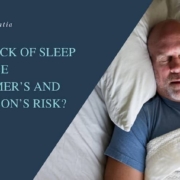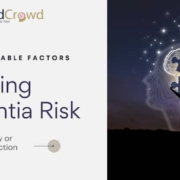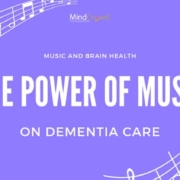What Causes Alzheimer’s Disease: Know the Risk Factors
We don’t know with certainty what causes Alzheimer’s disease. This is why scientists are still very interested in studying Alzheimer’s dementia.
Even though we may not know what causes Alzheimer’s disease yet, there are some things we do know. Typically, a person’s risk of getting Alzheimer’s is a combination of environmental (or non-genetic) factors and genetic factors.
So, let’s work backwards and share what causes the memory and thinking problems that we associate with Alzheimer’s.
The Inherited Factor: Is Alzheimer’s Genetic?
Only a very rare form of Alzheimer’s disease, called early onset Alzheimer’s disease, happens entirely due to genetics. Geneticists call it autosomal dominant Alzheimer’s disease.
This genetic change is usually inherited in families across multiple generations. If you inherit the genetic change, you cannot avoid getting Alzheimer’s disease, assuming you live to 40, 50, or 60 years of age.
Early onset Alzheimer’s disease represent less than 5% of all Alzheimer’s cases and the cause is 100% genetic.
But this is not the form of Alzheimer’s disease that the general population is worried about. The majority of the people have late onset Alzheimer’s disease which is not dominant. So, your genes or DNA could be a risk factor, but it does not mean you will get Alzheimer’s.
In summary, Alzheimer’s could be genetic but it’s a combination of environmental and genetic factors.
So, What Causes Alzheimer’s Disease? Or its Associated Memory and Thinking Problems?
Dr. Alois Alzheimer discovered the connection between amyloid plaques and dementia in 1906. These plaques and neurofibrillary tangles called tau tangles are the hallmark of Alzheimer’s disease. And they cause the cognitive decline observed in Alzheimer’s disease patients.
Memory, thinking, and behavior changes are caused by the death of brain cells called neurons. Neurons are important for most of the functions the brain performs, including encoding memories, recalling memories, thinking and behavior. All the brain processes that we see affected with Alzheimer’s disease.
Read this article to learn how brain cells die in people with Alzheimer’s.
But even though we don’t know what causes Alzheimer’s disease, there are risk factors that can lead to the development of dementia. And we are able to manage most of them to reduce this risk.

What are the Known Alzheimer’s Risk Factors?
The risks are genetic and non-genetic lifestyle factors. They are not the direct causes of Alzheimer’s dementia. Let’s review these risk factors.
- Age is the #1 risk factor. The longer you live, the higher the risk of being diagnosed with Alzheimer’s disease.
- Lack of exercise and unhealthy diet are lifestyle choices that we can manage to change over time. These articles on brain nutrition and on maintaining brain elasticity can help.
- Improper oral health. Poor oral health can impact other organs and systems in your body. For example, oral health has been linked to diabetes and cardiovascular disease. Both of them risk factors as well. Regular cleanings and dental appointments can help with more than just your smile.
- Too little sleep. Some studies suggest that sleep deprivation increases beta-amyloid build-up in the brain.
- High blood pressure in middle age. Discover more about hypertension and brain health.
- Lower education levels and fewer current cognitive challenges and activity.
- High body mass index later in life.
- Bacterial and viral infections.
- Too much stress. Sustained high stress is not healthy for your brain or body, and could also contribute to raising one’s risk for dementia. If you are concerned with PTSD, we answer this question too. Keep reading.
- Lack of socialization. Even in COVID times, we have human contact. With the cashier at the supermarket, the nurse at a geriatric, or a neighbor while walking by. You can socialize with other humans from a safe distance.
- Depression.
- Unmanaged or mismanaged diabetes.
- Cardiovascular disease, including stroke.
- Smoking. This article on how smoking affects memory performance can help.
- Excessive alcohol consumption.
- Physical trauma could contribute to your risk for Alzheimer’s disease. Primarily in the case of head injury or trauma that results in a loss of consciousness. Both of which are risk factors for developing Alzheimer’s disease.
- Related diseases like Parkinson’s may increase your risk. Yes, you can have Parkinson’s and Alzheimer’s.

Prefer a shortcut that can help protect your brain? Check out these 6 steps we can all take to improve brain health.
Can PTSD Increase your Risk of Alzheimer’s?
Research suggests that PTSD does not directly cause increases in Alzheimer’s brain pathology. However, other research suggests that there is some overlap between genetic risk factors for PTSD and Alzheimer’s disease.
It is important to note that research in this area is not conclusive and still ongoing and a subject of intense scientific interest.
Be part of the solution. Help scientists understand how to prevent dementia. Take the MindCrowd test today 👉 mindcrowd.org
MindCrowd is a scientific study that gives researchers a set of data baselines about how normal, healthy brains perform at different ages.
MindCrowd cannot diagnose dementia or predict the risk for cognitive decline. By taking this quiz you will help researchers in the future to more properly evaluate Alzheimer’s patients and usher in a new era of precision aging.
Test your brain 👉 mindcrowd.org 🙏
Understanding Risk of Alzheimer’s
Risk does not mean it will happen. Risk information intends to help people understand the possible consequences they face with the hope that they will make better health decisions.
The hardest thing to convey about risk is that everybody perceives risk differently. What one person might consider a risky behavior, another might not. Risk is related to your exposure, your vulnerability and your perceived level of control over the situation.
For example, you may find driving at very high speeds risky but a race car driver may not. Their experience reduces the level of risk. That does not mean that there is no risk.
You may drive like a maniac and nothing ever happens to you, or you may crash at the first intersection that you find. What would you say was the risk in each case?
In conclusion, you do not know with 100% certainty that it will happen because it’s just risk. Lower the risk and improve your odds.
Can Environmental Factors Alone Cause Alzheimer’s? No Genetic Factors Involved?
It’s really hard to answer this question scientifically. The studies in humans needed that look entirely at environment would be unethical because one would have to control a person’s environment for many years.
However, you can cause memory loss with only environmental factors. Many scientists have done exactly that in animal models by exposing them to toxins or other factors that are not genetic-related. So, it is possible but it’s not as likely that you can cause memory loss in humans with environmental factors only.
It is unlikely that late onset Alzheimer’s is all due to genetics. And it’s also as unlikely that it’s 100% due to environment factors.
But, and this is also very unlikely, there are cases where certain medicines can cause dementia. Sometimes medicines can mimic Alzheimer’s disease. Or you have memory loss on certain medications.
Usually the doctor can put you on a different drug and that effect will reverse. Your memory would go back to typical. Sometimes it’s more important to treat the disease the medication is used for because the known side effects are reversible or very rare.

Are you 99% Safe if there is no History of Alzheimer’s in your Family?
This is a very nuanced topic but it’s a very important one. Many people get Alzheimer’s disease in the absence of any family history. So, it isn’t surprising to get Alzheimer’s disease with no history of it in your family.
But think about it this way. If I asked you if Alzheimer’s runs in your family, you would think back to your parents, to your grandparents, and you may or may not know about your great-grandparents. You might say you are fine because none of them had Alzheimer’s disease. And that probably means that your genes are good.
But you also have to consider how medicine has changed throughout the years. Maybe your great grandparents were at high risk for Alzheimer’s disease but they didn’t live long enough. Or perhaps medicine didn’t recognize it as Alzheimer’s disease that many generations ago.
Family history means you have to transport yourself back in time and think about how medicine worked two generations ago.
How is your memory today?
Find out by taking the MindCrowd memory test online. Help bring us closer to a cure for Alzheimer’s and other dementias.
What if you Test your DNA?
If you get your DNA tested, what we can tell you today is your risk. The test cannot predict the future.
There are always people who are at a very high genetic risk for Alzheimer’s disease and they live a very long life to their 80s or 90s and do not get the disease. Their brain looks beautiful at death. Even though they were extremely high risk based on genetics, they beat the odds.
This is what is so hard to get across to the general public. We are not yet able to look at your DNA and tell you with certainty about your future.
Because of that, it is hard to advocate for getting a genetic test for Alzheimer’s disease. And we don’t have any medicines that are approved for treatment of people who don’t yet have symptoms.
I can tell you if you are very high risk but I have no solution for you. I don’t have an intervention that can prevent the disease.
This unveils the key areas that we are researching very strongly in the field of neurology. We want to better explain your risk so it’s closer to being able to look into the future with high accuracy. At the same time we want to provide you with therapies. Not necessarily drugs, but any type of intervention that could help prevent Alzheimer’s disease.
We hope this article will help you make more informed decisions about your lifestyle choices and reduce your risk of Alzheimer’s disease.
YOU CAN MAKE A DIFFERENCE.
MindCrowd is the first online research project of its kind to study millions of individuals to help bring us closer to a cure for Alzheimer’s.
Help us reach the 1 million people mark.
Stay Tuned for News about Brain Aging and How you Can Use them to Avoid Cognitive Decline.
Matt Huentelman is a neuroscientist and a human genetics researcher. His laboratory studies how the brain ages and explores various ways in which we can prevent brain aging and protect against diseases of the aging brain like Alzheimer’s disease. His lab is based at TGen in Phoenix, Arizona, and he is also the lead scientist for the MindCrowd project.
MindCrowd is an internet based study of the brain that anyone 18 years of age or older can join and it can be found at mindcrowd.org









Leave a Reply
Want to join the discussion?Feel free to contribute!